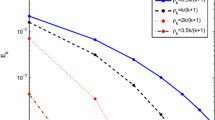Abstract
In this paper, four modified versions of relaxed CQ algorithms are proposed for solving the split feasibility problems (SFP) in infinite-dimensional real Hilbert spaces. The methods are based on replacing the projection to the half-space with that to the intersection of two half-spaces. The convergence speed is accelerated as the algorithms make use of the previous half-spaces. The stepsize is determined dynamically without requiring any prior information about the operator norm. Furthermore, the proposed algorithms are proven to converge strongly to the minimum-norm solution of the SFP. As an application, we apply our results to signal recovery problems.



Similar content being viewed by others
References
Bauschke, H.H., Combettes, P.L.: Convex Analysis and Monotone Operator Theory in Hilbert Spaces. Springer, Berlin (2011)
Byrne, C.: Iterative oblique projection onto convex sets and the split feasibility problem. Inverse Probl. 18(2), 441–453 (2002)
Byrne, C.: A unified treatment for some iterative algorithms in signal processing and image reconstruction. Inverse Probl. 20(1), 103–120 (2004)
Censor, Y., Bortfeld, T., Martin, B., Trofimov, A.: A unified approach for inversion problems in intensity modulated radiation therapy. Phys. Med. Biol. 51(10), 2353–2365 (2006)
Censor, Y., Elfving, T.: A multiprojection algorithm using Bregman projections in a product space. Numer. Algorithms 8(2–4), 221–239 (1994)
Censor, Y., Elfving, T., Kopf, N., Bortfeld, T.: The multiple-sets split feasibility problem and its applications for inverse problems. Inverse Probl. 21(6), 2071–2084 (2005)
Dang, Y., Sun, J., Xu, H.: Inertial accelerated algorithms for solving a split feasibility problem. J. Ind. Manag. Optim. 13(3), 1383–1394 (2017)
Dang, Y., Sun, J., Zhang, S.: Double projection algorithms for solving the split feasibility problems. J. Ind. Manag. Optim. 15(4), 2023–2034 (2019)
Dong, Q.L., He, S., Rassias, M.T.: General splitting methods with linearization for the split feasibility problem. J. Glob. Optim. 79, 813–836 (2021)
Gibali, A., Liu, L.-W., Tang, Y.-C.: Note on the modified relaxation CQ algorithm for the split feasibility problem. Optim. Lett. 12, 817–830 (2018)
Gibali, A., Mai, D.T., Vinh, N.T.: A new relaxed CQ algorithm for solving split feasibility problems in Hilbert spaces and its applications. J. Ind. Manag. Optim. 15(2), 963–984 (2019)
He, S., Yang, C.: Solving the variational inequality problem defined on intersection of finite level sets. Abstr. Appl. Anal. 2013, Article ID 942315 (2013)
Jouymandi, Z., Moradlou, F.: Extragradient and linesearch methods for solving split feasibility problems in Hilbert spaces. Math. Methods Appl. Sci. 42(12), 4343–4359 (2019)
Kesornprom, S., Pholasa, N., Cholamjiak, P.: On the convergence analysis of the gradient-CQ algorithms for the split feasibility problem. Numer. Algorithms 84, 997–1017 (2020)
Li, H., Wu, Y., Wang, F.: New inertial relaxed CQ algorithms for solving split feasibility problems in Hilbert spaces. J. Math. 2021, 1–13 (2021)
López, G., Martín-Márquez, V., Wang, F., Xu, H.K.: Solving the split feasibility problem without prior knowledge of matrix norms. Inverse Probl. 28(8), 085004 (2012)
Shehu, Y., Dong, Q.L., Liu, L.: Global and linear convergence of alternated inertial methods for split feasibility problems. RACSAM 115, 1–26 (2021)
Shehu, Y., Gibali, A.: New inertial relaxed method for solving split feasibilities. Optim. Lett. 15(6), 2109–2126 (2021)
Suantai, S., Kesornprom, S., Cholamjiak, W., Cholamjiak, P.: Modified projection method with inertial technique and hybrid stepsize for the split feasibility problem. Mathematics 10(6), 933–944 (2022)
Suantai, S., Pholasa, N., Cholamjiak, P.: The modified inertial relaxed CQ algorithm for solving the split feasibility problems. J. Ind. Manag. Optim. 14(4), 1595–1615 (2018)
Wang, F.: Polyak’s gradient method for split feasibility problem constrained by level sets. Numer. Algorithms 77(3), 925–938 (2018)
Wang, F., Xu, H.K.: Approximating curve and strong convergence of the CQ algorithm for the split feasibility problem. J. Inequal. Appl. 2010, 102085 (2010)
Xu, H.K.: Iterative methods for the split feasibility problem in infinite-dimensional Hilbert spaces. Inverse Probl. 26(10), 105018 (2010)
Yang, Q.: The relaxed CQ algorithm solving the split feasibility problem. Inverse Probl. 20(4), 1261–1266 (2004)
Yu, X., Shahzad, N., Yao, Y.: Implicit and explicit algorithms for solving the split feasibility problem. Optim. Lett. 6, 1447–1462 (2012)
Yu, H., Wang, F.: A new relaxed method for the split feasibility problem in Hilbert spaces. Optimization 1–16 (2022)
Author information
Authors and Affiliations
Corresponding author
Ethics declarations
Conflict of interest
The authors declare no conflicts of interest.
Additional information
Publisher's Note
Springer Nature remains neutral with regard to jurisdictional claims in published maps and institutional affiliations.
Rights and permissions
Springer Nature or its licensor (e.g. a society or other partner) holds exclusive rights to this article under a publishing agreement with the author(s) or other rightsholder(s); author self-archiving of the accepted manuscript version of this article is solely governed by the terms of such publishing agreement and applicable law.
About this article
Cite this article
Ling, T., Tong, X. & Shi, L. Modified relaxed CQ methods for the split feasibility problems in Hilbert spaces with applications. J. Appl. Math. Comput. 69, 3067–3094 (2023). https://doi.org/10.1007/s12190-023-01875-7
Received:
Revised:
Accepted:
Published:
Issue Date:
DOI: https://doi.org/10.1007/s12190-023-01875-7




